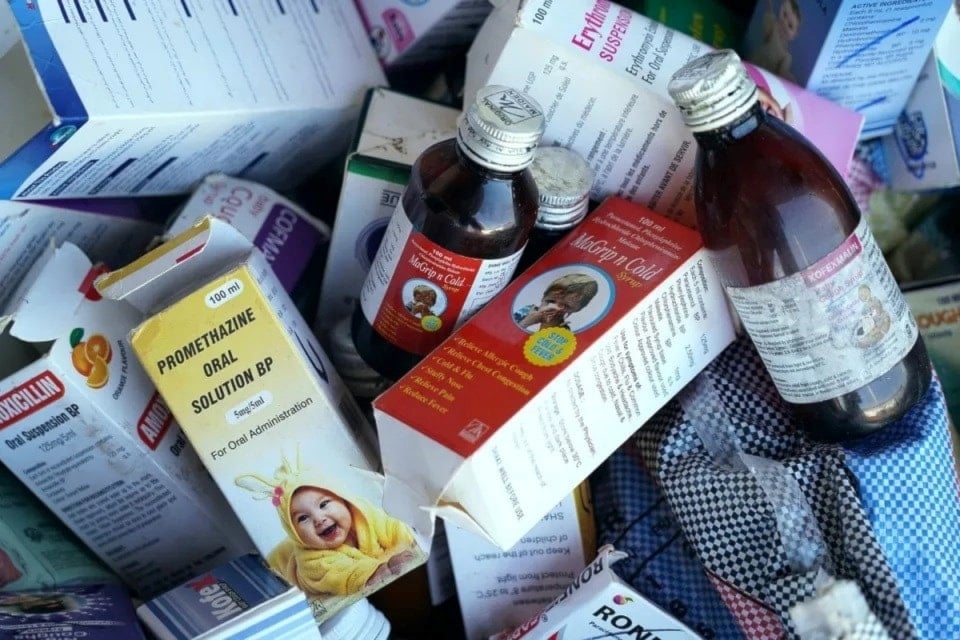Toxic cough syrup deaths expose major flaws in India’s drug oversight
Officials are probing how an unlicensed supply chain and repackaged solvent allowed a toxic industrial chemical to contaminate cough syrup and kill Indian children.
-

A photograph shows collected cough syrups in Banjul, The Gambia, in October 2022. (AFP via Getty Images)
Indian authorities are examining whether failures in the supply chain of a key pharmaceutical ingredient led to the contamination of cough syrup that has killed at least 24 children in recent months, Reuters reported, citing three officials briefed on the investigation.
The health and drug safety officials from Tamil Nadu told Reuters they suspect that the solvent used in a batch of Coldrif cough syrup may have been tainted with a toxic industrial chemical at the time it was supplied to drugmaker Sresan Pharmaceutical Manufacturer.
Sresan purchased 50 kg of propylene glycol (PG) from chemicals distributor Sunrise Biotech on March 25. Sunrise had sourced the chemical the same day from Jinkushal Aroma, a small producer of fragrance blends used in detergents and other chemicals, according to interviews and an investigation report dated October 3 from the Tamil Nadu pharmaceutical regulator, seen exclusively by Reuters.
Industrial chemical linked to deaths
Tests have shown that the Coldrif syrup contained diethylene glycol (DEG), a known industrial toxin. Investigators are now tracing how the chemical entered the solvent, which is typically used as a base to dissolve active ingredients in cough syrups. Indian health officials have warned that DEG is sometimes used fraudulently or by accident in place of higher-quality PG. High exposure to DEG can cause severe kidney damage and death, especially in children.
The fatalities, which began in September, have renewed scrutiny of India’s $50 billion pharmaceutical industry. The sector has faced multiple scandals in recent years, including incidents in Africa and Central Asia in 2022 and 2023, where more than 140 children died after consuming Indian-made syrups contaminated with toxic chemicals. Despite government promises of stricter controls after those tragedies, officials say gaps remain.
Sresan’s operating licence has now been revoked, and the company’s founder, G. Ranganathan, is in custody.
Oversight failures and supply chain risks
National regulators have referred questions to India’s Health Ministry, which said in a statement that more inspections were underway and that the government was reassessing the use of cough syrups for children. One of the key concerns is that the PG was repackaged before delivery. Sunrise confirmed to Reuters that it supplied the chemical in containers without seals, contrary to standard practices aimed at preventing contamination.
Under India's Drugs and Cosmetics Act, only licensed entities may handle pharmaceutical-grade ingredients such as medicinal PG. However, neither Sunrise nor Jinkushal had drug-handling licences. Their owners said they were unaware that the PG would be used in medicine production and denied handling DEG. Reuters was unable to determine how or at what point the contamination occurred.
Multiple violations found at manufacturer
Following the deaths, state inspectors documented extensive breaches at Sresan’s factory outside Chennai, including “unhygienic conditions” and “falsification of data,” according to the October 3 report. The findings classified hundreds of issues as “critical” or “major,” though the report did not directly attribute those violations to the children’s deaths.
According to documents seen by reporters, Sresan told regulators it used PG supplied by the South Korean producer SK picglobal. A certificate of analysis provided to investigators listed manufacturing details and chemical specifications. SK picglobal told Reuters the certificate appeared authentic.
Repackaging raised contamination risk
SK picglobal said it shipped the solvent in a sealed 215 kg drum to an Indian distributor. Jinkushal owner Jitender Vishwakarma confirmed he had opened the barrel and repackaged the contents into smaller containers before selling part of the supply to Sunrise. Sunrise’s Vipul Jain said he delivered the chemical to Sresan in unsealed containers because the company had not purchased the full original drum.
SK picglobal said it prohibits the repacking or subdivision of its products and has told customers it does not “guarantee the quality of products that have been re-packed or arbitrarily subdivided for sale.”
Officials familiar with the case said Sresan had previously faced penalties, with its founder briefly jailed in 2020 and 2022 before being fined. Tamil Nadu’s health minister recently informed lawmakers that Sresan had been penalised in 2021 and 2023 for “minor violations,” though details were not disclosed.
Despite such issues, two state officials confirmed that the factory had not been inspected since 2023, although annual checks are mandatory.

 4 Min Read
4 Min Read








